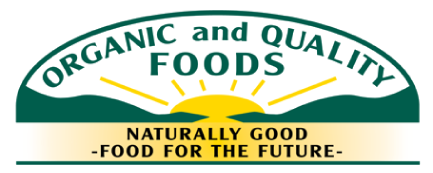What are the benefits of consuming organic foods?
- The amounts of chemicals entering your body will be reduced and this should naturally make you feel better
- Certified organic is the only guarantee that the foods you consume have not been genetically modified.
- EAT HEALTHY, BE HEALTHY – possible reduction of future health costs.
- Future generations will thank you for supporting an industry that does not pollute our environment.
How do I know that the produce is really organic?
- Certification of produce is extremely important. A genuine retailer will always provide information to consumers about certification grades and which AQIS approved body certified the produce.
- A genuine retailer will have many customers who react strongly to even the slightest amounts of chemicals. These customers know a genuine retailer and will stay with them.
- Price is also an indication of whether produce is truly organic. Organic growers are aware of the prices paid in the market for certified produce and given the higher costs associated with organic production it would defy logic to sell their produce below market price.
- Limited supply means that organic retailers will always be without some lines (eg. carrots) or will need to ration what is available.
Does organic food contain higher levels of nutrients?
- Yes, studies have shown that organic produce often contains considerably higher levels of nutrients. For example, a study at Rutgers University (USA) found organic tomatoes contained 1,584 times more iron than non-organic tomatoes.
- It is the higher levels of minerals and vitamins that gives organic food its richer and better taste, just the way nature intended.
Why does organic food cost more?
- growing organic produce is very labour intensive and therefore is mostly grown on a small scale. So the benefits achieved by large conventional growers through ‘economies of scale’ are not possible for organic growers.
- labour is expensive in Australia, and an industry requiring greater manual labour input must have higher costs. The growing of onions is one example of this – an organic grower must remove all weeds by hand, whereas a conventional onion grower simply sprays the crop with weedicide.
- without the use of chemicals an organic grower must spend far more time working his crops to prevent disease and destruction by pests. He must also compost the soil properly, which usually takes a minimum of 12 months.
- an organic grower loses a far greater percentage of the crop than a chemical farmer.
- the price of conventional food does not include the true costs to the community resulting from its production. The costs of health care and long-term damage to the environment are not factored into the price. One day we will all have to pay the real costs for the extensive use of chemicals.
- the ‘law of supply and demand’ can also affect the price of organic produce. Because supply is often unable to meet demand, this can result in higher prices. If Melbourne buyers are paying growers $40 a bag for carrots then in Brisbane we also have to match this price to secure supply.
- When you consider the greater nutrition and positive environmental impact of organic foods then in real terms organic produce is cheaper than chemically grown produce.
Does organic food look any different?
- Yes…and no! Good quality organic produce will often look as good as the best available conventional produce. However, we must remember why we have chosen to consume organic product – because of its lack of chemicals and greater nutrition, not because of how it looks.
- We stand by the produce we supply – if the produce has deteriorated too much to consume we will replace or refund the item.
Will I always receive what I order?
- Sometimes you may not receive all of the produce ordered. This is because of the great difficulty obtaining certified produce at times. Weather conditions may wipe out an entire crop overnight, or rain may prevent the farmer getting the produce to market on time…not to mention seasonal shortages.
- We will NEVER substitute conventional produce for unavailable certified produce. As a result if we are unable to replenish our stocks then we will either ration the produce (where possible) or you may miss out on the item. We apologise for any inconvenience that this policy may cause but we believe it is essential for us to only supply genuine organic produce
What are your Ordering/Payment Options?
ORDERING OPTIONS
- Delivery Charges of only $5.95 on orders $75 – $100 and only $4.95 on orders over $100. (Extra fees may apply for outlying areas or if $75 Minimum orders are not met).
- Ability to customise your order. You get exactly what you want (No set boxes)
- Live Online Store – Revise / Add to orders as many times as needed before your deadline
- Order your Fruit and Vegetables by the Kilo or by the Item.
- Orders can be taken via phone, fax, email or online. We then deliver to your door, all by OQF staff or distributors: NO couriers!
PAYMENT OPTIONS
Payment – Cash, Cheque, VISA, Mastercard or Direct Bank Depositank Deposit
What is your Return/Refund Policy?
OQF will gladly refund/replace any item if you are not satisfied!

